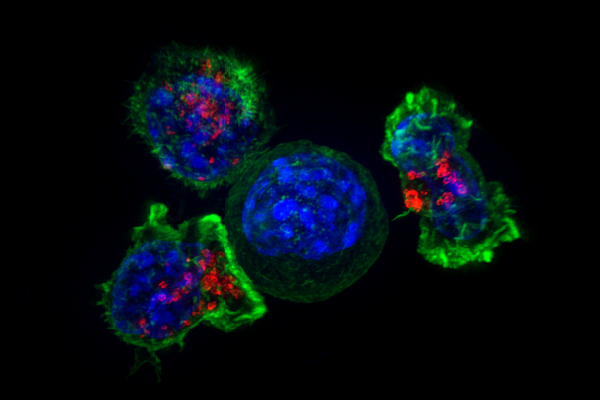Cancer researchers locate drivers of tumor resistance

Cancer biologists at the Mays Cancer Center, home to UT Health San Antonio MD Anderson, have identified important drivers that enable tumors to change their behavior and evade anticancer therapies.
By studying tumors in cell lines, mice and human samples, the team documented genetic signals that promote the conversion of cancer cells from one stage to another. The journal Nature Cell Biology published the research May 18.
"Although we focused on breast cancer in this study, we believe the identified mechanism can apply to all treatment-resistant cancers," said study senior author Zhijie "Jason" Liu, Ph.D., assistant professor of molecular medicine in the Long School of Medicine at UT Health San Antonio. He is a research member of the Mays Cancer Center.
"The same phenomenon is happening in lung cancer, prostate cancer and many other cancers," Dr. Liu said.
The ability of cancer cells to take different shapes, to grow faster or slower, and to vary in size is called "phenotypic plasticity." Cancers that acquire plasticity often are more dangerous, becoming metastatic and resistant to many targeted therapies, Dr. Liu said.
The team's next step is to screen new drugs, in the form of small molecules, that disrupt the genetic signals underlying tumor plasticity. Such a drug could be administered along with current targeted therapies to eliminate the problem of resistance to those treatments, Dr. Liu said.
"If we target the drivers of phenotypic plasticity, we may increase the effectiveness of many therapies and cure more cancers," Dr. Liu said.
The team is led by Dr. Liu and his long-term collaborator Lizhen Chen, Ph.D., an assistant professor in the Sam and Ann Barshop Institute for Longevity and Aging Studies and the Department of Cell Systems and Anatomy at UT Health San Antonio. They collaborated with researchers in Paris, France, and Shanghai, China, who provided human patient tumor samples for the project.
More information: Enhancer reprogramming driven by high-order assemblies of transcription factors promotes phenotypic plasticity and breast cancer endocrine resistance, Nature Cell Biology (2020). DOI: 10.1038/s41556-020-0514-z , www.nature.com/articles/s41556-020-0514-z

















